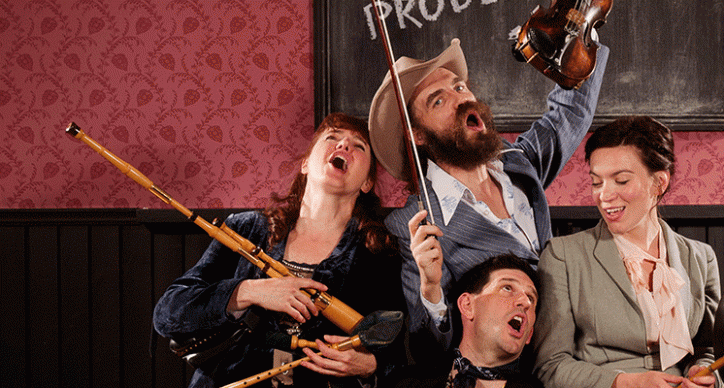3 Questions for Director Wils Wilson
Editor’s note: This piece is a part of a series. You can also read Leslie Stainton’s essay on the power of place (or not) in theater.
Photo: Cast of The Strange Undoing of Prudencia Hart. Photo by Simon Murphy.
The Strange Undoing of Prudencia Hart is at Corner Brewery in Ypsilanti January 8-13. Our regular contributor Leslie Stainton interviewed the play’s director, National Theatre Scotland’s Wils Wilson.
Leslie Stainton: What happens to the theatrical experience when you move it into a pub (or other unconventional venue)? Does the audience change?
Wils Wilson: When the audience come into the venue for Prudencia Hart, there is a folk music session already going on. People are playing and singing, you can get a drink from the bar, you choose where to sit at small tables, and the performers come and talk to you in an informal way, asking you to do a simple task. So already the atmosphere is communal, convivial, playful and warm. We’re all in the same room together. It’s completely unlike the conventional theatre experience from the start, a different contract between audience and performers, one that allows space for a lot of intimacy, fun and emotional engagement.
A different space always brings with it a different audience. You get a conventional theatre audience, and you also get people who are intrigued to see how their bar or community hall will be used. There’s a sense of event, which has an appeal to a wide variety of people, so you often get a very mixed audience which is a huge advantage.
LS: How do Robert Burns, Border Ballads, and the poems of Robert Service speak to a global audience in the 21stcentury?
WW: David [David Grieg, creator of Prudencia] and I were attracted to the Border Ballads because they are fantastically dramatic stories of love, death, passion and the supernatural. They deal with such fundamental emotions and ideas they feel timeless. Robert Service’s wrote hugely popular tales of bold deeds in energetic rhyming verse again dealing with love, betrayal – big universal themes. It’s interesting, having played Prudencia now in a number of countries, that the idea of a folk tradition with stories of the devil and a borderland between this world and another, seems to be recognized wherever we go. The truth is that when you make a new piece, you just have to make something which feels necessary and relevant to you and which you yourself are truly interested in and challenged by – and if you make it well enough, it will speak to people wherever you go.
LS: Technology is increasingly defining our world. Where does live theater fit into this? How can theater help redress the imbalance we now seem in danger of experiencing?
WW: People will always be hungry for live theatre, music, dance, events. Nothing in the virtual world will ever replace seeing a real performer in front of you, seeing and feeling their emotion, seeing the sweat on their forehead.
So I think theatre should feel very confident just now, both in its own unique power and in how it engages with technological innovation. The two worlds don’t have to be seen in opposition. They will both continue to exist alongside each other, serving different needs.







